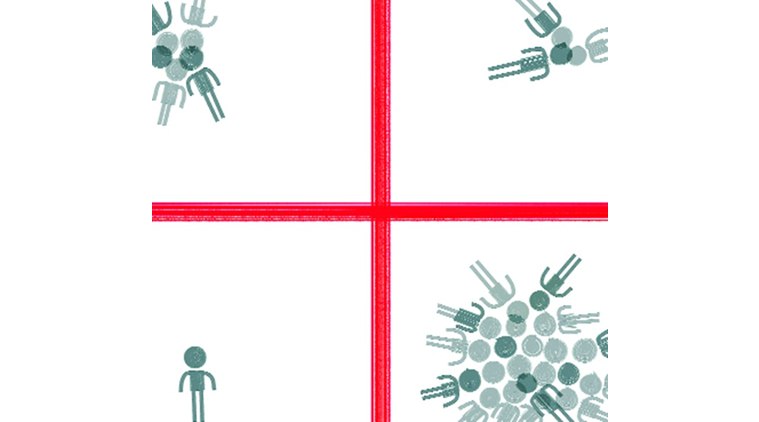
“Beg to differ” was one of the many phrases that made no sense but you had to get used to them in order to learn English. That this phrase would one day become essential had never occurred to me. Now it has. I feel like using it all the time these days. Differing from another person in public is full of risk, so if begging secures you some kindness in advance, there is no harm in begging. This is, of course, not why an English gentleman said, “I beg to differ”.
Many old expressions that have gone out of use in the native land of the English continue to be used in India. Our system of education keeps them alive. They are regularly used in administration, police procedures and in the judiciary. As an English-using nation, our status has improved and many of our English writers are treated as mother-tongue speakers.
Consider the staple of colonial history. The English practised a divide and rule policy, according to several Class 8 history textbooks. According to them, Partition was a consequence of this policy. If that is so, why are we doing the same thing now? Divide and rule seems to have become the winning ideology of the current election. We call it differently now. The term preferred by television anchors and the press is polarisation. They say the outcome of this election will depend on the extent to which the polarising rhetoric of the ruling party succeeds. Other parties are also said to be following this approach except they are polarising along regional or caste lines.
If this is indeed a continuation of colonial strategies, we should return to authors like Paul Scott and Albert Memmi. I read the latter in a course on Third World development. Along with Franz Fanon, Memmi made immense sense though both these authors were concerned with Africa. The story of India was different from that of Africa and Latin America, but there were continuities too. The ones in economic relations between the colonisers and the colonised were easy to notice and grasp. Not so visible were the psychological parallels, especially because figures like Gandhi made India look and feel different from anywhere else. He seemed to have given India a new identity, putting the fear of imperial power at rest. Memmi’s thesis was that loss of identity and fear push the colonised towards religion. If Gandhi averted that fate for India, his success was neither total nor permanent. Had it been so, the colonial formula of divide and rule on religious lines wouldn’t have come back to haunt this election.
Having taught colonialism for over two decades, I am used to facing the criticism that it is an irrelevant topic. The fact that the system of education continues to carry numerous marks of its colonial legacy does not make colonialism a worthwhile topic of study. Unless you present it as history, you can’t get very far with students who believe that colonialism ended when India gained freedom. They attribute its living legacies to inefficient administrators and politicians. It doesn’t help much either if you try to distinguish colonial rule from colonial relations and the ideology they signify. Gandhi’s critique of the colonial worldview arouses some interest in the few who agree to wonder why education does not fortify people against divisive propaganda. Indeed, the view that the common people are emotional and their hearts are more important for votes than their minds is also a colonial legacy. Many senior British administrators were guided by the stereotype of Indians as emotionally driven people, lacking rationality. This stereotype gained popularity among Indians who started to identify with colonial masters, not just in lifestyle but in ideas and perceptions too.
An important distinction needs to be made about election propaganda. Identity politics is part of a much larger social phenomenon. It has grown in recent decades in response to the growth of collective self-awareness and communication among dispersed members of communities. Creation of vote banks along caste lines is one thing; actively promoting religious otherness is quite different. The emotive potential of the two processes also differs. In the first case, people who see their caste identity as means of consolidating their material interests come together without necessarily hating others who identify with a different voting collective. In the case of divisive otherness along religious lines, inimical feelings are mixed with anger and aggression.
The advantage that colonial rulers derived by using divide and rule policies was that they weakened resistance. What advantage can a divide and rule strategy offer today? It will make India less governable even if you win one more chance to govern it by putting the coloniser’s strategy to fresh use. It will also weaken the state apparatus. Institutions in charge of maintaining law and order have not outgrown the legacy and shadow of colonial history. As recent events show, even institutions that directly manage the electoral process now prefer to overlook than intervene.
Our diversity alone will save us when divide and rule is back in business. No emotion seems to last long in a diverse social landscape. Nor does any emotional mood cover India’s territorial vastness. Even during patches of war, such as 1962, 1965 and 1971, the awareness of problems like water and food shortage was quite widespread. Regional issues remained sharply capable of influencing politics. This is unlikely to change, and the current phase is particularly prone to the force of diversity. A slow and staggered election schedule has also helped to keep emotions temporal and stuck to local anxieties. No emotion lasts long, no matter how assiduously it is aroused. Divide and rule might have served as a strategy during certain phases of colonial rule, but it did not work in every case. Its contemporary use merely demonstrates the persistence of the temptation that India’s colonial rulers had felt during their stay.
The author is a former director of NCERT and a Hindi writer